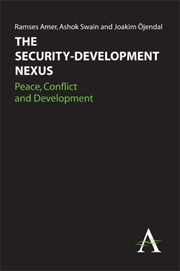Book contents
- Frontmatter
- Contents
- List of Tables and Figures
- List of Editors and Contributors
- Acknowledgements
- Chapter 1 Researching the Security-Development Nexus through a Multi-disciplinary Approach
- Chapter 2 Exploring the Security-Development Nexus
- Chapter 3 Liberal State-Building and Environmental Security: The International Community between Trade-Off and Carelessness
- Chapter 4 The Rising China and Maintaining the International Order: Some Reflections
- Chapter 5 Non-use of Force, Non-interference and Security: The Case of Pacific Asia
- Chapter 6 International Dimensions of Peace Processes in Aceh and Sri Lanka: The Role of Intermediaries in the 2000s
- Chapter 7 The Challenges of Human Security and Development in Central Asia
- Chapter 8 Diasporas' Role in Peacebuilding: The Case of the Vietnamese-Swedish Diaspora
- Chapter 9 Tracing Minerals, Creating Peace: The Security-Development Nexus in the DRC
- Chapter 10 Water Management and the Security-Development Nexus: The Governing of Life in eThekwini Municipality, South Africa
Chapter 8 - Diasporas' Role in Peacebuilding: The Case of the Vietnamese-Swedish Diaspora
Published online by Cambridge University Press: 05 June 2012
- Frontmatter
- Contents
- List of Tables and Figures
- List of Editors and Contributors
- Acknowledgements
- Chapter 1 Researching the Security-Development Nexus through a Multi-disciplinary Approach
- Chapter 2 Exploring the Security-Development Nexus
- Chapter 3 Liberal State-Building and Environmental Security: The International Community between Trade-Off and Carelessness
- Chapter 4 The Rising China and Maintaining the International Order: Some Reflections
- Chapter 5 Non-use of Force, Non-interference and Security: The Case of Pacific Asia
- Chapter 6 International Dimensions of Peace Processes in Aceh and Sri Lanka: The Role of Intermediaries in the 2000s
- Chapter 7 The Challenges of Human Security and Development in Central Asia
- Chapter 8 Diasporas' Role in Peacebuilding: The Case of the Vietnamese-Swedish Diaspora
- Chapter 9 Tracing Minerals, Creating Peace: The Security-Development Nexus in the DRC
- Chapter 10 Water Management and the Security-Development Nexus: The Governing of Life in eThekwini Municipality, South Africa
Summary
Introduction
The main purpose of the study is to investigate how the linkages between some key dimensions of current globalization trends involving advances in aviation and global telecommunication systems have enhanced international travel and facilitated migrations, thereby making it easier for people to stay connected with family and friends all over the world. Diasporas are transnational communities formed when people migrate from their country of origin to live in one or more host countries, but maintain identity with the ancestral homeland. There are various circumstances, such as violent conflicts, natural disasters, poverty at home and economic opportunity abroad, under which people leave their homeland in search of a new place to settle (Hall, Kostić and Swain 2007, 9).
The role of diasporas in peacebuilding or conflict promotion in their homeland has been a subject of debate among scholars. Case studies of the Armenian, Kurdish, Sikh and Tamil diasporas have been presented as clear examples to illustrate their roles in supporting conflicts in their respective homelands (Cochrane, Baser and Swain 2009; Singh 2007; Hoffman et al. 2007). On the contrary, Ghanaian, Jewish and Irish diasporas have been cited as examples diasporas promoting peace in their country of origin. However, diasporas have very complex allegiances and may choose whether to promote peace or conflict in the homeland, depending on the prevailing circumstances. Moreover, there are even disagreements within members of the same diaspora group on whether to promote peace or engage in conflict.
- Type
- Chapter
- Information
- The Security-Development NexusPeace, Conflict and Development, pp. 161 - 182Publisher: Anthem PressPrint publication year: 2012
- 2
- Cited by



